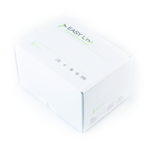| Line | Method & Sample | Product | Package Info |
|---|---|---|---|
| MOLgen | Clinical Specimens | MOLgen Genetics Haemostatic Diseases (PAI-1/ITGB3) Kit | Tests per Package: 48 |
| Genetics | “Molgen Genetics Haemostatic Disease (PAI-1/ITGB3) Kit” is an assay kit for the detection of single nucleotide polymorphism in PAI-1 and ITGB3 genes of blood coagulation system usingreal-time PCR with detection of melting curves | Code: ME138330 | Package Format: STR |

For Quantity Orders: Request a Quote
Please pay attention to the revision of the document that must be the same as the revision reported in the box label.
In case of discrepancy please contact our Customer Care e-mail: info@adaltis.net.
* Other document related to the product available at Documentation Centre and it is accessible for Adaltis distributors/partners after registration only.
“Molgen Genetics Haemostatic Disease (PAI-1/ITGB3) Kit” is an assay kit for the detection of single nucleotide polymorphism in PAI-1 and ITGB3 genes of blood coagulation system usingreal-time PCR with detection of melting curves.
“Molgen Genetics Haemostatic Disease (PAI-1/ITGB3) Kit” is intended for the detection of single nucleotide polymorphism 5G(-675)4G in PAI-1 gene (encodes serpin 1, endothelial inhibitor of plasminogen activator) and T1565C in ITGB3 gene (encodes integrin beta-3, a part of fibrinogen receptor) in clinical specimens (whole blood, buccal epithelium) using the method of real-time polymerase chain reaction (PCR) with melting curve analysis.
The results of genotyping are taken into account in complex evaluation of thrombophilia risk (susceptibility to hereditary thrombophilia).
The extraction of DNA from clinical specimens can be performed using “Molgen Universal Extraction Kit”.
The kit is intended for use with block-type PCR cycler CFX96 (Bio-Rad, USA) such as Adaltis AmpliLab.
The kit contains reagents required for 48 tests, including control samples.
The principle of the method is based on the amplification of the selected human DNA region with subsequent formation of hybrid duplexes of PCR product with the specific DNA probe and the detection of duplexes melting curves.
The amplification step consists of repeated cycles: temperature denaturation of the DNA template, primers annealing to specific sites of the DNA template, and primer extension with Taq polymerase.
After the amplification step, the temperature is lowered and the specific fluorescent-labelled DNA probe hybridizes with the quencher-labelled amplicon resulting in the decrease of the fluorescent signal. During the melting step, the DNA probe is released leading to the fluorescence increase. The melting temperature of the duplex containing a mismatch is lower than that of fully complementary duplex.
DNA-probe for 5G(-675)4G polymorphism detection is complementary to normal PAI-1 gene; DNA-probe for T1565C polymorphism detection is complementary to mutant ITGB3 gene. Thus, the melting temperature is different for two allelic variants. As a result, the genotype for each polymorphism can be identified (normal homozygote, heterozygote, mutant homozygote).
|
Reagent |
Content |
|
Control Sample “Normal homozygote” (CS1) |
1 tube, 1.0 mL |
|
Control Sample “Mutant homozygote” (CS2) |
1 tube, 1.0 mL |
|
Ready Master Mix for PCR (RMM) (lyophilized) |
48 tubes (tests) |
|
Specimen Diluent “Genetics” |
2 vials, 12 mL each |
|
PCR optical-quality film (or hinged caps) |
1 sheet |
|
Number of tests |
48 |
|
Code |
ME138330 |
Need assistance to make an order? Contact Sales & Orders Centre order@adaltis.net.
For Application Support application@adaltis.net